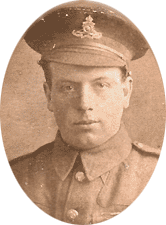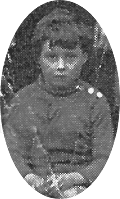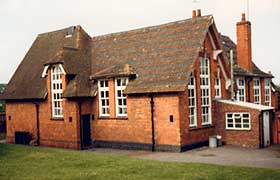|
FINE RECORD OF PATRIOTISM The adjoining villages of Loughton and Shenley have set a magnificent example of patriotism. There is scarcely a young man from the two parishes of military age who is not now "Doing his bit" for his King and Country, either in preparing himself for the stern realities of war, or sharing in the nation and the empires responsibilties at the front. Just over forty young fellows from the two villages have joined the Colours, which is a record of which Loughton and Shenley may well be proud. From the Bucks Standard May 29th 1915. |
||||||||
 |
The Loughton School eventually closed in 1915 when the men who taught at Shenley School went off to war and the two schools amalgamated. The women teachers from Loughton, Maude Cresswell and Gertrude Stevens, joined what remained of the staff at Shenley School, which continued to educate the children of both villages for many years. |  |
||||||
| Alfred William Bodley, of Loughton, who was a decorated gunner at the Battle of the Somme. He was the father of Peggy Bodley. | ||||||||
|
|
||||||||
|
|
||||||||
 |
||
| Jack Dolling lived in Loughton and went to school in Shenley in the 1920's. Below he remembers what life was like for a child in those days. |
 |
||
|
|
||
"When I was walking in Bradwell Road, and saw all the traffic, I thought back to the time when I was a boy. In those days we could walk and play in the road, which was then called Loughton Lane and, coming home from school, play with our whips and tops, which always seemed to be a Spring pastime. After our whips and tops, next in the Spring came our hoops (wooden ones when we were small) then iron hoops which we bowled with sticks, unless you could get the blacksmith to fix you a hook on to the hoop, which we called a "skimmer". We used to run what seemed to be miles with them.
Shrove Tuesday was always a half day holiday from school and that was, or seemed to be, set aside for paper chasing with the paper running out and a free for all starting. The followers always reckoned the paper had been dumped so they couldn't find the trail.
I suppose the brook was to a lot of us the centrepiece of Spring. First there were newts and tadpoles to find, then moorhens nests and wild ducks. The number of eggs we took home for tea it was a wonder there were any moorhens left for the following Spring, but they seemed to come back in just the same numbers.
As the weather got warmer we used to go paddling. As you got a bit older you started to learn to swim and a lot of the boys learned very well. Possibly because the water got so thick and muddy we couldn't sink.
The variety of birds and nests were wonderful. There were kingfishers, willow warblers, all the finches, blackbirds, thrushes, owls, pigeons; if you were lucky you might find a pheasant's nest and plovers. We used to spend hours by the brook and in the fields.
To see the boys going fishing with their elaborate fishing gear now, I think how we used to go off with our willow sticks, homemade lines and float and a penny hook. We used to catch quite a lot of fish and eels. The eels we could sell for a penny if they were a decent size.
One of my happiest times was when I was the age of about eleven or twelve. I went on the farm driving horses at haymaking and harvest time, for all of my summer holidays. I think when I look back the horses knew more about the job than I did, but I enjoyed every minute of it.
I can remember the first tractor coming to the farm (1924 or 1925). What was said about that stinking thing by the old farm hands couldn't be written down, but they all reckoned that they wouldn't take on. Nothing would take the place of the horse".